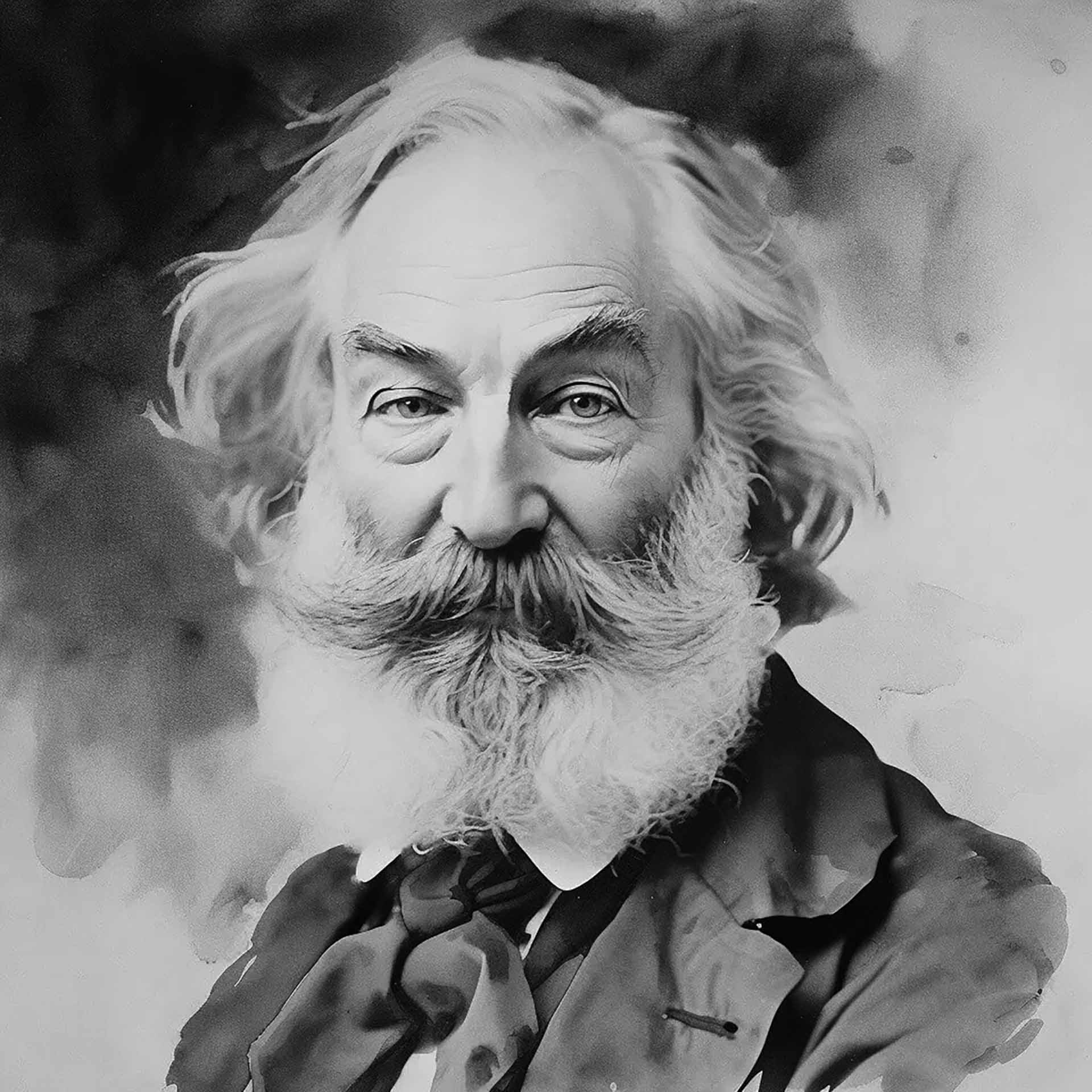Walt Whitman (1819-1892) was an American political writer and journalist, but is best known as a poet and reformer of American poetry (free verse without rhyme).
 |
| Walt Whitman, American political writer and journalist. |
He is the author of the world- famous collection of poems, *Leaves of Grass* , which has become the bible of American poetry. His talent is recognized and admired not only in America but also in Europe. His poetry has influenced modern literature in two ways: its free and unconstrained style, and its liberation of sexuality and instinct.
Whitman considered himself to have the mission of being the voice of the voiceless, yet as universal and eloquent as grass. His poetry emerged in the 1850s, precisely at a time when American literature was asserting itself and flourishing with him; with Nathaniel Hawthorne (1804-1864) and Herman Melville (1819-1891), all three of whom began with the transcendentalism of Ralph Waldo Emerson (1803-1882). This philosophy believed in the divine capacity of the free individual.
Like many writers of his generation, Walt Whitman had to work hard to make a living. He was born in West Hills, Long Island, to a carpenter father and a Dutch mother. When Whitman was four years old, his family moved to Brooklyn. It was during this time that he began to familiarize himself with publishing, printing, and writing.
From the ages of 16 to 21, he worked as a teacher and wrote the series of essays "Sun-Down Papers from the Desk of a Schoolmaster." In 1841, he left teaching and returned to New York City to work in a printing press. In 1842, he became an editor for the New York Aurora newspaper. During this time, he began to devote more time to poetry. He worked various jobs: carpenter, papermaker, teacher, typesetter, fisherman... He was a diligent self-taught man.
In 1855, when the poetry collection " Leaves of Grass Today," which became the bible of American poetry, was published, it was met with fierce criticism. Whitman could not find sponsors, so the author funded everything himself, from book design and publishing to distribution. Out of a thousand copies printed, less than thirty were sold. Several hundred copies sent as gifts were mostly returned. The poems broke all meter and rhyme, lacking rhythm and meter. This first edition of the collection contained 12 poems. The author introduced himself in an opening poem, later titled "Song of Myself "—a rather bland and uninspired piece.
“Walt Whitman, a universe, son of Manhattan Island,
Rebellious, obese, pleasure-seeking, fond of eating, drinking, and procreation.
Not overly sentimental, not looking down on others, whether men or women, not separating oneself from everyone.
Neither humble nor unhumble.
He was heavily criticized by moralistic critics for returning to cosmic instincts, for daring to openly praise sexuality, the physical aspect which he considered as sacred as the soul.
The Song of Myself is the central theme of the collection, expressing self-confidence and urging people to measure their own strength and place themselves within the cosmic currents of nature. The poet John Greenleaf Whittier (1807-1892) threw the collection into the fire after reading the song. Ralph Waldo Emerson (1803-1882), America's first philosopher, who called for American intellectuals to be independent from Europe, bravely defended Whitman: "Americans abroad can return. An artist has been born in our country."
Leaves of Grass (1855-1892) is Whitman's only known work. First published with 12 poems, less than a hundred pages long, when the author was 36 years old, it eventually grew to 411 poems before his death at the age of 73. The poet asserted his American character (landscapes, people, liberal government) and cosmic nature (vibrant life) with mystical conceptions of the ordinary and modern man, of the world of love and democracy.
The poetry collection *Leaves of Grass* is the only work of poetry that portrays the multifaceted aspects of American life and promotes democratic ideals. In the 20th century, *Leaves of Grass* is recognized as one of the most important literary events, revolutionizing poetry with the birth of a new poetic form – free verse, which Walt Whitman initiated.
Walt Whitman's poetry has influenced many great poets of the world, such as: Thomas Stewart Eliot (1888-1965), Ezra Weston Pound (1885-1972), Galway Mills Kinnell (1927-2014), Langston Hughes (1901-1967), William Carlos Williams (1883-1963), Pablo Neruda (1904-1973), Jean Nicolas Arthur Rimbaud (1854-1891), Federico García Lorca (1898-1936), Fernando Pessoa (1888-1935), and Vladimir Vladimirovich Mayakovsky (1893-1930).
Source: https://baoquocte.vn/dao-choi-vuon-van-my-ky-8-272459.html



![[Image] Current situation of houses precariously balanced due to road leveling in Dong Nai.](https://vphoto.vietnam.vn/thumb/1200x675/vietnam/resource/IMAGE/2026/03/02/1772455749144_ndo_br_z7579763955585-6e80a60471e75768fa835d035eba45ea-6979-jpg.webp)




![[Photo] Procession of a giant "pig" weighing over 200kg at the La Phu Village Festival](https://vphoto.vietnam.vn/thumb/1200x675/vietnam/resource/IMAGE/2026/03/02/1772444501339_anh-man-hinh-2026-03-02-luc-16-40-20.png)












![[Podcast] Tran Temple Festival – A journey to discover the legacy of the heroic spirit of Dong A](https://vphoto.vietnam.vn/thumb/402x226/vietnam/resource/IMAGE/2026/03/03/1772500160354_720-jpg.webp)

























































































Comment (0)